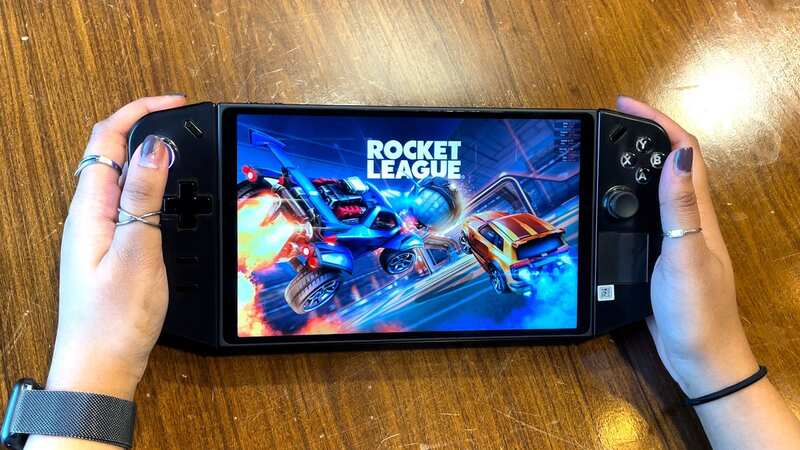

The Lenovo Legion Go will be the latest gaming handheld to hit the market, and after spending some time with it, I think it could change the game.
Mirror Gaming was invited to a hands-on preview of the upcoming Lenovo Legion Go handheld gaming PC, which will be released on October 31, 2023. Although I wasn't able to test any games on the device, I did get a closer look at the hardware on offer and was able to gauge what you can expect from the device.
The Lenovo Legion Go price comes in at £699 / $699 / AU$1399 for 256GB, with different pricing options for higher storage amounts. It's definitely at the pricier end of gaming handhelds along with the Asus ROG Ally, however, it definitely lives up to its cost so far, featuring a gorgeous 8.8-inch screen, detachable controllers, an AMD Ryzen Z1 Extreme processor, and a bespoke interface.
For those who are concerned about operating systems, the Lenovo Legion Go runs on Windows 11 meaning you're able to play games from any storefront or library including the likes of Xbox Game Pass, Epic Games, Steam, and a ton of others. You can also use the device for productivity such as video editing or just browsing the internet.
When first picking up the Lenovo Legion Go, the most noticeable aspect is the screen, which is not only much bigger than other gaming handhelds but also clocks in at 144Hz, is touchscreen and has a resolution of up to 2560 x 1600p. The colour grading and max brightness are gorgeous and the bezels around the side are so small that they're barely noticeable which is a very nice change from my original Nintendo Switch.
 Back to School deals on laptops
Back to School deals on laptops
Paired with the massive 8.8-inch screen are some pretty beefy controllers, which is one of the reasons why the Lenovo Legion Go weighs a rather hefty 854 grams, which is heavier than other handhelds on the market but still lighter than most gaming laptops. The device also comes with a carrying case to protect it when you're on the go but this also adds extra weight to the device when you're carrying it around, and it's worth noting that you really can feel it.
As mentioned above, the Lenovo Legion Go controllers are detachable, much like the Nintendo Switch, and the device itself has a kickstand allowing you to prop it up when you're not using it in handheld mode. The controllers are comfortable to hold, both in handheld mode and separately, despite being quite big. All of the buttons are easy to reach and I never felt like I was having to strain to press any of them.
In terms of the Lenovo Legion Go specifications, you're getting a CPU chip that has built-in AMD RDNA graphics in the form of the AMD Ryzen Z1 Extreme, which is the same processor found in the Asus ROG Ally Extreme edition. Alongside this, you also get 16GB of laptop DDR5 RAM which runs at a speed of 7500Mhz, beating out the alternatives on the market.
Lenovo Legion Go specifications
- Processor: AMD Ryzen Z1 Extreme with AMD RDNA Graphics
- Operating System: Windows 11 Home
- Memory: 16GB 7500Mhz LPDDR5X
- Storage: 256GB / 512GB / 1TB PCIe 4.0 NVMe M.2 22428
- Weight: Controllers Detached:640g & Controllers Attached: 854g
- Display: 8.8 inches, 144Hz, 2560 x 1600p, touchscreen
- Sound: 2 x 2W Speakers
There are three storage options to choose from, all of which are Gen 4 NVMe SSDs. However, you also get a MicroSD card slot at the top of the device which currently supports up to 2TB MicroSD cards for those who are worried about running out of space for their larger game libraries.
Similar to other handhelds, as well as being able to utilise Windows 11 as normal, you also get access to a bespoke interface that allows you to access all of your game libraries in one place as well as adjust all of the settings for your device. It was easy to use and navigate and wasn't harsh on the eyes, instead just adopting a simple blue colour scheme.
You get access to a wide range of settings to adjust, including the fan speed, performance level, and power usage. So if you're playing a more intensive game and can feel the device getting hot, you can crank it up. On the other hand, when you're on the go and don't want your Lenovo Legion Go to sound like a PC powering a NASA rocket, you can turn the fans down too to suit your environment.
I'm really looking forward to the Lenovo Legion Go release. As a massive fan of both the Asus ROG Ally and Nintendo Switch, it feels really exciting to have a device that is a lovely combination of the two. Based on the hardware alone, it seems like games will perform exceptionally on the device, however, this is all down to optimisation and firmware which we're yet to see.
All we can do now is wait to get our hands on a unit, so that we can fully review the Lenovo Legion Go and hope it lives up to its next-level specifications, hardware and price point. If you're thinking about picking up the Lenovo Legion Go as an upgrade from your Steam Deck you can see how the two compare against each other in our versus piece.